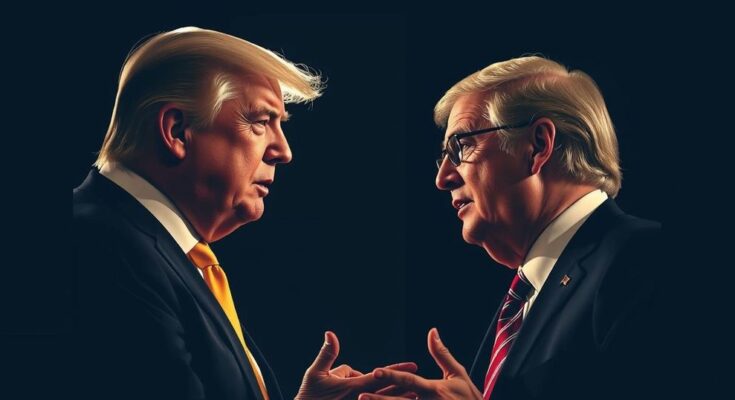The article contemplates the challenges facing American democracy as the election results are awaited, emphasizing the polarized nature of voter support. It discusses Donald Trump’s appeal to disenfranchised voters and his chaotic foreign policy theory, which prioritizes national interests and focuses on bilateral trade deals. In light of a potential Trump victory, it suggests that Australian Prime Minister Anthony Albanese should visit Washington early to discuss strategic partnerships and regional stability.
The upcoming weeks will undoubtedly put American democracy to the test, as the outcome of the presidential election remains uncertain. The electoral landscape exhibits nearly equal support for the respective candidates, segmented along various demographic lines such as gender, education, race, and geography, with the final voter turnout likely influencing the outcome. Former President Donald Trump has demonstrated a unique ability to connect with voters who harbor a sense of alienation and skepticism towards national institutions, advocating for a revival of a preferred economic and social framework. The impact of social media has intensified societal divisions, reviving culture wars reminiscent of a past defined by a different normalcy, disrupted by immigration and an increase in rights. Trump’s supporters largely reject the notion of engaging in abstract ideological battles on the international stage, prioritizing national interests and domestic stability instead. Trump’s approach, often characterized by a chaotic foreign policy style, positions him as an experienced deal-maker, advocating for a shift in America’s global role. His theory of chaos in statecraft suggests that unpredictability might deter adversaries and yield peace. He posits that relationships with authoritarian leaders should be cultivated rather than contested, highlighting a preference for unilateralism in trade, favoring American surpluses over deficits. Consequently, this foreign policy underscores the importance of bilateral agreements, specifically those advantageous to the United States. In the event of a Trump victory, it is advisable for Australian Prime Minister Anthony Albanese to initiate a visit to Washington swiftly. As Australia enjoys a distinguished relationship with the United States, it is crucial to engage in pre-trip consultations with key partners in the region, particularly Japan, to reinforce collective dialogue on security and economic matters. Albanese’s visit should encompass discussions rooted in mutual interests, emphasizing the significance of regional partnerships like AUKUS and the Quad. A focus on the Indo-Pacific’s security and economic architecture will be paramount, advocating for the value of American participation in multilateral agreements and regional bodies, including ASEAN. The absence of American leadership could lead to alternative arrangements among regional players as history demonstrates. Without active involvement, the U.S. risks losing its influential standing in trade agreements while others, such as China, capitalize on unilateral opportunities for engagement. Overall, understanding the interplay between the global rules-based order, soft power, and alliances remains critical for American security and international stability.
This article examines the implications of the potential election of Donald Trump for international relations, particularly through the lens of Australia’s diplomatic strategies. It highlights the divisive nature of American politics, where support for candidates aligns closely with demographic and societal splits, resulting in a polarized electorate. The author reflects on Trump’s unorthodox foreign policy and transactional style, suggesting that his presidency could necessitate a recalibration of Australian diplomacy aimed at sustaining beneficial international connections, particularly regarding security and economic actions that align with U.S. interests. The article underscores the need for Australia to proactively engage with the U.S. under a Trump administration to safeguard its national interests.
In conclusion, the anticipated election results may prompt a recalibration of international diplomatic strategies, particularly for Australia. Prime Minister Anthony Albanese is encouraged to prioritize an early visit to Washington to reinforce bilateral relations and discuss pertinent regional security and economic issues. Engaging in dialogues with allies and emphasizing mutual benefits from cooperative frameworks in the Indo-Pacific is essential for sustaining advantageous ties between Australia and the United States under a potentially Trump-led administration.
Original Source: www.theguardian.com




